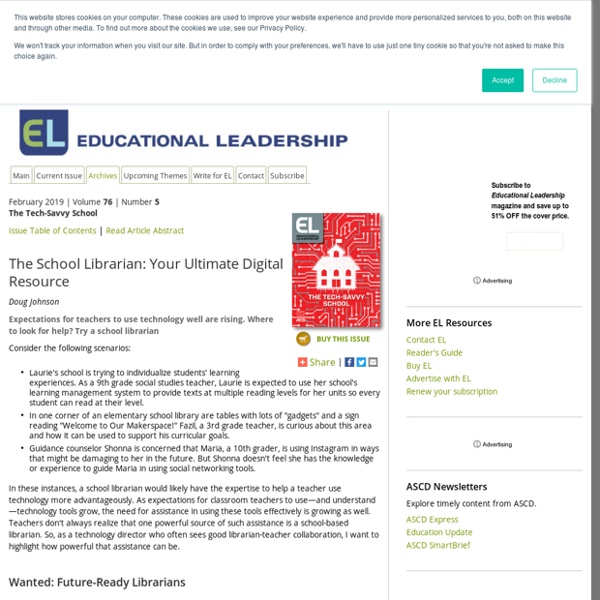



The importance of having a school library Lisa Kent, the chapter leader at PS/IS 155 in Bedford-Stuyvesant, Brooklyn, has taught there for 22 years. In all that time, the school has never had a working library. That finally changed this spring, thanks to the school’s current and former principals, community grants and donors, PTA volunteers and the tenacity of art teacher Lisa Ryan. Using School Library Newsletters to Communicate As in many schools, my high school library is a hub of our building. Hundreds of students walk through our doors each day; administrators stop by; teachers are posted to duty at the circulation desk every period; custodians and security guards come to say hi; classes learn research–it is a space filled with energy. Because of my place in this bustling library bubble, I’m surprised every time I hear a teacher’s name I’ve never heard before. I’m only in my second year at my school, but I’ve made a point of going out of my way to meet as many teachers and employees as possible. There are still some people, though, with whom I have yet to connect. Whether it’s a teacher who has a chaotic schedule and a classroom on the other side of the building, or an administrator who works in an off-site office, there are circumstances that prevent us from meeting or collaborating.
*Pitching the Library: the Elevator Speech Presented by Michelle Luhtala, Library Department Chair, New Canaan High School, CT; and Susan Ballard, Program Developer and Instructor USNH Sponsored by Mackin Educational Resources If you attended the live session, you’ll be emailed a CE certificate within 24 hours of the edWebinar. If you view the recording and would like a CE certificate, join the Emerging Tech community and go to the edWebinar Archives folder to take the CE quiz. When administrators are faced with challenging budget cuts, they frequently cut from library programs—often because they don’t understand how strong library programs serve the learning community. In this edWebinar, Michelle Luhtala, Library Department Chair at New Canaan High School, CT, who just returned from the American Association of School Librarians (AASL) National Conference, interviews Susan Ballard, Program Developer and Instructor at USNH.
The Constantly Evolving Role of the School Librarian Over the past twenty years, perhaps no position in education has transformed more than the school librarian. I spoke with two veteran school librarians to get a better idea just how much their jobs have evolved: Dr. Andrea Ange is a veteran librarian and web master at Campbell High School in Litchfield, NH.Marifran DeMaine is a high school librarian in Putnam Valley, NY with additional experience working in public, elementary, and middle school libraries. The District Library Newsletter: An Advocacy Tool As you plan your advocacy efforts for 2019, don’t forget about your district-level administrators. The decisions they make can have a huge impact on your library and on your district’s library program. Even if they’ve always been supportive of libraries, don’t assume they know what goes on in your space. After all, they aren’t in your building, much less in your library, every day. Make sure you have a plan to let them know what you do and why it matters to students (and teachers).
What is an "elevator speech"? An elevator speech is a clear, brief message or “commercial” about you. It communicates who you are, why you are valuable, and how you can benefit your stakeholders. It’s typically about 30 seconds to 1 minute, the time it takes people to ride from the top to the bottom of a building in an elevator. Elevator speeches are handy to have rehearsed to advocate for school library programs in all kinds of situations: those planned and those unexpected. Let’s start with “why”. Librarians' Changing Roles Can Inspire School Communities I'm in a new job this fall, moving from K-5 to the library at Western Albemarle High School in Crozet, Virginia. It's a great chance to look back at what I've learned and what I've tried during a time of transformation in school libraries. Libraries have always been focused on users and communities, but recent support for makerspaces and experimentation, coupled with the benefits of system-wide support from Albemarle County Public Schools, has allowed librarians to spearhead inspiring changes. As I change schools, I plan to build on some of the new approaches that I've tried. For a high school, the context is different -- and the curriculum is very different -- but the user-focused approach and the willingness to tinker and try is sure to carry over in the following four practices.
The Time for Advocacy Is Now: Why Telling Your Story Is So Important. Having been a lifelong reader and library user, I had all sorts of assumptions about school libraries in general. First, I thought that stakeholders would instinctively know the value of an effective school library. Secondly, I had always been under the impression that school libraries in general were adequately funded and that budgets were never in question.
Pivoting for Impactful Advocacy “When people look slowly, they make discoveries.” –Austin Kleon, Keep Going: 10 Ways to Stay Creative in Good Times and Bad (2019) The “School Librarian Role in Pandemic Learning Conditions” document focuses on the five important roles of a school librarian–instructional partner, teacher, leader, information specialist, and program administrator–during remote, hybrid, and in-person education. The 9-page resource guide and chart were created to help school librarians who were looking for suggestions and guidance on how to engage with learners and educators in all three learning environments. As Courtney Lewis highlighted in the previous post, themes emerged from the feedback from the AASL Town Halls during the spring. The three of us, along with AASL Executive Director Sylvia Knight Norton, sought to identify a useful way to present the information in the town halls to school librarians as they prepared to go back to school—in whatever form that took.